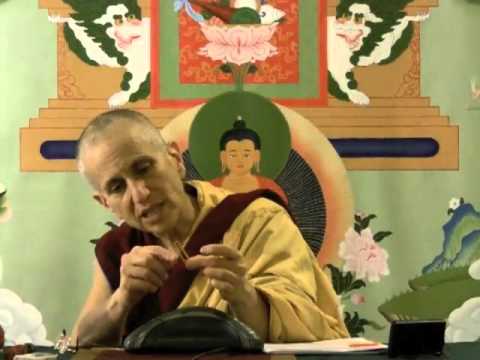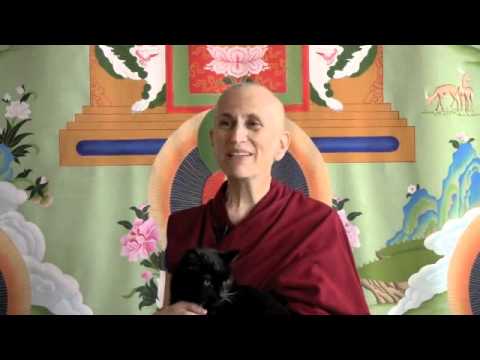Rejoicing and dedicating
This talk was given during the White Tara winter retreat at Sravasti Abbey.
- How rejoicing increases good karma
- Importance of remembering to rejoice and dedicate
- The circle of three
White Tara Retreat 40: Dedication and rejoicing and the circle of three (download)
This talk is about dedication; and last time I mentioned rejoicing in our own and others’ virtues.
Rejoicing
Rejoicing is very important because when we rejoice we increase the good karma. Even if we didn’t do the action, by rejoicing in others good actions, we create merit. You can see when we rejoice our mind becomes happy and our mind’s in a virtuous state, so you can see how it creates merit.
It’s advised to rejoice in the virtuous activities of ourselves and others. Others include all ordinary beings (and kitties) but then also all the Buddhas, the bodhisattvas, the arhats, the pratyeka buddhas. To really think of all virtue created by everyone everywhere and rejoice in it. Then also, not just the virtue that’s being created now but also in the past and the virtue that sentient beings will create in the future.
You can get into a whole meditation just on rejoicing at all the goodness that there is in sentient beings: helping each other, making offerings, keeping good ethical conduct, practicing fortitude, meditation, and bodhicitta. Just think of all the good things people are doing. It’s said that when you do that, if the person is of equal level, then you create the same karma that they did. But if they’re at a more advanced level, if we rejoice at the virtues of Buddhas and bodhisattvas and arhats, then we create a fraction of their level of what they did. So it’s very advantageous to do that. Also it really helps us get in touch with how much goodness there is in the world. Especially when we rejoice at the virtues of like His Holiness the Dalai Lama and all the realized teachers, then it kind of gives us a direction where we want to go in our practice.
Dedicating
So we rejoice and then we also dedicate. We’ve got to remember both of those: rejoicing and dedicating. When you’re doing the practice of the 35 Buddhas, it’s also called The Sutra of the Three Heaps which are confessing, rejoicing and dedicating. If you read the verses at the end, you’ll see that there’s a whole section on rejoicing and a whole section on dedicating. This is really emphasizing the importance of those two things.
Circle of three
When we dedicate, we also want to do it with an awareness of what we call the circle of three. The circle of three means [1] ourselves who are dedicating, [2] the object, the merit we’re dedicating to or also it could be those we’re dedicating for—you know the enlightenment of sentient beings—and then [3] the action of dedicating itself. In other words, all the different elements that are involved in dedicating merit. All of these things arise dependent on each other. None of them exist inherently with their own essence, independent of each other. So then this becomes a meditation on dependent arising, which also leads you to a contemplation of emptiness—because if these things arise dependent on each other, then they don’t have their own inherent essence.
When you think about it, when you think of me as the person who’s dedicating, it seems like there’s a real me who’s a real dedicator. But there’s no me who’s a dedicator without the action of dedicating. We don’t become a dedicator unless there’s the action of dedicating, and the merit we’re dedicating, and the goal we’re dedicating for. Similarly, there’s no action of dedicating unless there’s a dedicator and a dedicatee.
There’s no object, or dedicatee, unless there’s the action of dedicating and the dedicator. By seeing that all of these things don’t exist on their own accord, we see that become what they are in dependence on each other. In that way, we see there’s no inherently existent merit that’s being dedicated. Also, something being designated as merit depends on something else being negative karma. Yes? So nothing’s inherently good and nothing’s inherently bad. Things are good and bad but dependently, not inherently.
Similarly, seeing ourselves as some independent being who’s doing the action of dedicating—we need to get rid of that thought and see that the person who’s dedicating is also just, you know, dependent on all the other parts and also on their own causes, and so on. There’s no concrete person there either who’s doing this action. There are no concrete sentient beings receiving the result of our dedication.
When we do this, then it’s a complete action [or karma] because we’ve had the motivation of bodhicitta, we did the action, and then we’re dedicating with an understanding of emptiness and dependent arising. It becomes very complete. By meditating in this way, on emptiness and dependent arising at the end, it prevents the merit we’ve created from getting destroyed.
I’ll stop there and the next time I’ll talk about how we destroy our merit if we don’t dedicate.
Venerable Thubten Chodron
Venerable Chodron emphasizes the practical application of Buddha’s teachings in our daily lives and is especially skilled at explaining them in ways easily understood and practiced by Westerners. She is well known for her warm, humorous, and lucid teachings. She was ordained as a Buddhist nun in 1977 by Kyabje Ling Rinpoche in Dharamsala, India, and in 1986 she received bhikshuni (full) ordination in Taiwan. Read her full bio.


